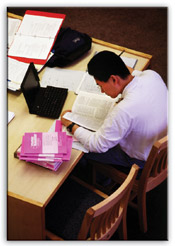| |
 |
|
|
Vol. 74, No. 7, July 2001
|
 Preparing
for Practice Page 1 Preparing
for Practice Page 1
Vital Skills
Along
with legal analytical and reasoning skills, the ability to communicate
well ranks high on numerous lists of essential lawyering skills.2
Legal employers and law school graduates alike ranked these as the most
important skills in Assessment 2000, a survey study conducted last year
by attorney and U.W. Law School Assistant Dean Carolyn Lazar Butler for
the University of Wisconsin Law School, Madison, with funding from the
Benchers Society. From that study, "a clear message was that we do a wonderful
job teaching people to analyze legal issues and legal problems," says
Dean Kenneth B. Davis Jr., "but we need to do better at working on communication
and other kinds of professional skills."
 St.
Louis attorney Diane Yu hears the same sort of reactions as she visits
law schools and talks to lawyers across the country in her capacity as
chair of the ABA Legal Education and Admissions to the Bar Section. "One
of the concerns I hear about most is writing quality," Yu says, "and specifically,
what's persuasive writing versus just a bunch of words." St.
Louis attorney Diane Yu hears the same sort of reactions as she visits
law schools and talks to lawyers across the country in her capacity as
chair of the ABA Legal Education and Admissions to the Bar Section. "One
of the concerns I hear about most is writing quality," Yu says, "and specifically,
what's persuasive writing versus just a bunch of words."
Both Wisconsin law schools pour significant resources into teaching
legal writing. Still, it seems they could never do too much, as legal
employers see it. All first-year law students at both schools take legal
writing as a requirement, and they can follow up later with an advanced
legal writing course. Nearly two-thirds of employers surveyed in Assessment
2000 believe that advanced legal writing should be a part of a law student's
basic education, in addition to the introductory course.
And yet law students often don't take full advantage of opportunities
in law school to improve their writing skills, or realize that such opportunities
are available to them, says Laura Dunek, a 1996 U.W. Law School graduate
who now teaches a first-year legal writing and research course there.
She's also president of the State Bar of Wisconsin Young Lawyers Division.
Dunek believes law students need to be proactive in developing the skills
necessary to succeed in their legal careers. Now that she's an instructor,
Dunek makes sure her first-year law students understand the importance
of getting advanced training in legal writing and research skills, whether
through course work or practical learning experience. At the beginning
of the semester, she informs her students that of the 90 credits required
to graduate, only three have to be in a legal research and writing class,
and the remaining 87 could all be in substantive law courses. "I tell
them they have to even the score a bit," Dunek says. "I also tell them
that, as hard as I may try, I can't give them everything they need in
three credits. With writing skills, you start with a foundation, and then
you build upon those skills."
And that, points out Madison attorney Joy O'Grosky, is a career-long
process. "Anybody who believes that people leave law school with all the
writing skill they need is misguided," says O'Grosky, who's been in practice
since graduating from the U.W. Law School in 1987. "I'm still improving
my writing, and I think anybody who's good at it does that."
While O'Grosky sees adequate mechanical writing skills in the medical
malpractice litigation associates she trains in her law firm, what she
believes is severely lacking is new lawyers' ability to organize their
thoughts, which impacts the strength of both their oral and written communications.
And it's gotten worse during the 14 years O'Grosky has worked with new
lawyers, who have been graduates of many different law schools.
The cause, she believes, is a growing dependency on computers. She stresses
that in no way is she condemning computers; she uses her own heavily in
all phases of her practice, from research to jury presentations. But in
young people, she sees a lack of being able to think a matter through
without having it laid out before their eyes on a computer screen. "They
can't think in their heads," O'Grosky contends. "I'll say to them, 'Tell
me if you think we should sequester witnesses,' and they just sit there,
looking at me. Then I say, 'Pound out your answer on the computer.' You
wouldn't believe the difference."
Because of this tendency, new lawyers' oral communications suffer because
they can't respond on the spot, as lawyers often must. As for written
communication, the generation that grew up with "cut and paste" is accustomed
to spewing out paragraphs and then rearranging them. "They don't know
how to outline or just sit down and think through the logical flow of
ideas first," O'Grosky observes. "So they'll move things around on the
screen, but the result is still disorganized. Things are just in another
place."
It's not a matter of blaming young lawyers for this deficiency, O'Grosky
emphasizes, nor of expecting law schools to fix it before young lawyers
enter practice. Rather, it's a sign of the times that legal educators
and practitioners both need to recognize and try to remedy. "It's foolish
to expect law schools to teach how to advocate (through effective legal
writing). That's what experienced lawyers have to be willing to contribute.
It's a challenge for all of us," she says. "We have to find ways to teach
people skills they have never had to develop."
Preparing
for Practice Page 3: Street Smarts
|
